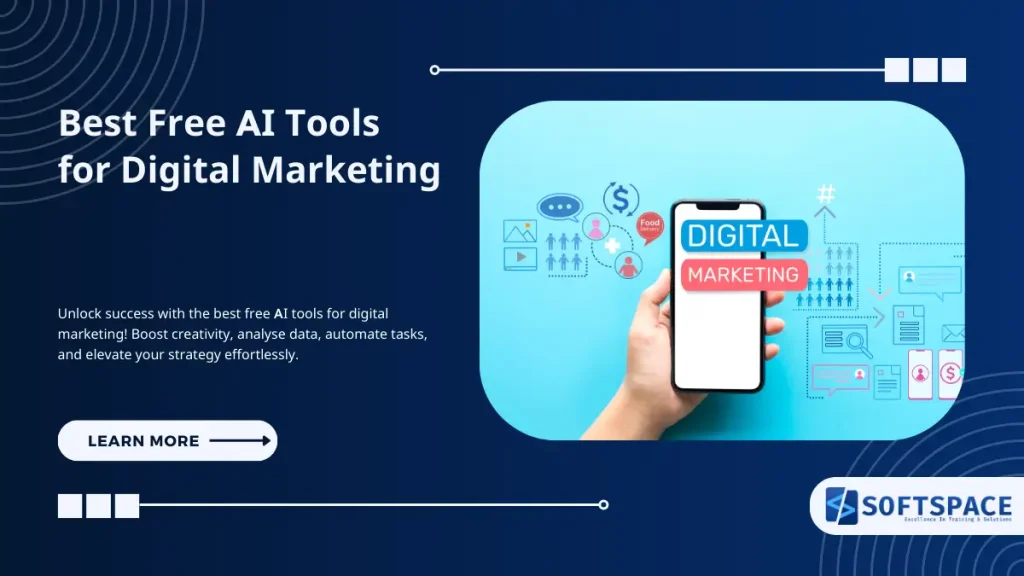In the rapidly evolving landscape of digital marketing, artificial intelligence (AI) has emerged as a transformative force, enabling businesses to optimize their strategies, streamline operations, and enhance customer engagement. As of 2025, the adoption of AI tools has become a necessity rather than a luxury, with marketers leveraging these technologies to gain a competitive edge in a crowded marketplace.
The best free AI tools for digital marketing, in particular, have gained significant traction, offering powerful capabilities without the burden of financial investment, making them accessible to businesses of all sizes.
AI-powered tools are revolutionizing various aspects of digital marketing, including content creation, social media management, email marketing, market research, and customer service. These tools utilize machine learning and automation to perform tasks such as predictive analytics, sentiment analysis, SEO optimization, and personalized content generation.

For instance, tools like ChatGPT and Flick are widely recognized for their ability to generate creative content and streamline social media strategies, while platforms like Zapier automate repetitive tasks, saving valuable time for marketers.
The growing demand for free AI tools is driven by their ability to democratize access to advanced marketing technologies. According to recent studies, over 20% of marketers have allocated more than 40% of their budgets to AI tools and strategies, highlighting the increasing reliance on these solutions.
Free tools such as Rytr and Copy.ai cater to budget-conscious marketers by offering robust features at no cost, while others like Algolia provide scalable options with pay-as-you-go pricing models.
This report delves into the best free AI tools for digital marketing in 2025, exploring their features, benefits, and potential limitations.
By understanding the capabilities of these tools, businesses can make informed decisions about integrating AI into their marketing strategies, unlocking new efficiencies and opportunities for growth.
Whether you’re a small business owner, a digital marketer, or part of a large enterprise, this guide will provide valuable insights to help you navigate the dynamic world of AI-driven marketing.
Best Free AI Tools for Digital Marketing
The Role of Free AI Tools in Digital Marketing
Free AI tools have become a cornerstone in modern digital marketing strategies, offering businesses cost-effective solutions to enhance efficiency and performance. These tools automate repetitive tasks, analyze large datasets, and provide actionable insights, enabling marketers to focus on creativity and strategy. Unlike premium tools, free AI solutions often cater to startups, small businesses, and individual marketers who need robust functionality without significant financial investment.
Free AI tools are particularly useful for tasks such as content creation, SEO optimization, campaign management, and customer engagement. For example, tools like ChatGPT are widely used for generating personalized content, while others like Google Analytics offer insights into user behaviour and campaign performance.
Key Features of Free AI Tools for Digital Marketing
Automation of Repetitive Tasks
Free AI tools excel at automating mundane and repetitive tasks, such as email scheduling, social media posting, and keyword research. This automation not only saves time but also reduces the likelihood of human error. Tools like Mailchimp’s Free Plan allow marketers to set up automated email campaigns, while Hootsuite Free provides basic social media scheduling capabilities.
Real-Time Data Analysis
Many free AI tools offer real-time analytics, enabling marketers to make data-driven decisions quickly. For instance, Google Analytics provides comprehensive insights into website traffic, user behaviour, and conversion rates. These insights help marketers optimize their strategies in real-time, ensuring maximum ROI.
Personalization Capabilities
AI tools enhance customer engagement by delivering personalized experiences. Free tools like HubSpot’s Free CRM use machine learning to segment audiences and recommend tailored marketing strategies. This level of personalization increases customer satisfaction and loyalty.
SEO Optimization
Search Engine Optimization (SEO) is a critical component of digital marketing, and free AI tools simplify this process. Tools like Ubersuggest and AnswerThePublic offer keyword suggestions and content ideas, helping marketers improve their website rankings without incurring additional costs.
Popular Free AI Tools for Digital Marketing
ChatGPT for Content Creation
ChatGPT is a versatile tool for generating high-quality content, including blog posts, social media updates, and email campaigns. Its natural language processing capabilities make it ideal for creating engaging and personalized content. Unlike premium content generators, ChatGPT’s free version offers sufficient functionality for small-scale projects.
Google Analytics for Performance Tracking
Google Analytics is an indispensable tool for tracking website performance. It provides insights into user behaviour, traffic sources, and conversion rates, enabling marketers to refine their strategies. The free version is robust enough for small to medium-sized businesses.
Canva for Visual Content
Canva is a popular tool for creating visually appealing marketing materials. Its free version includes templates for social media posts, infographics, and presentations, making it a valuable resource for marketers with limited design skills.
Grammarly for Copy Editing
Grammarly enhances the quality of written content by identifying grammatical errors and suggesting improvements. Its free version is particularly useful for marketers who need to produce error-free content quickly.
Ubersuggest for SEO
Ubersuggest is a free SEO tool that provides keyword suggestions, backlink data, and content ideas. It is an excellent resource for optimizing website content and improving search engine rankings.
Emerging Trends in Free AI Tools for Digital Marketing
Integration with Other Platforms
Free AI tools are increasingly offering integration capabilities with other software, enhancing their functionality. For example, Zapier’s Free Plan allows users to connect multiple apps and automate workflows, making it easier to manage complex marketing tasks.
Enhanced User Interfaces
As competition among free AI tools intensifies, developers are focusing on improving user interfaces to make their tools more accessible. Tools like Canva and Hootsuite Free are known for their intuitive designs, which simplify the user experience.
Focus on Data Privacy
With growing concerns about data privacy, free AI tools are adopting stricter security measures. For instance, HubSpot’s Free CRM complies with GDPR regulations, ensuring that user data is handled responsibly.
Advanced Features in Free Plans
Some free AI tools are incorporating advanced features to attract more users. For example, Grammarly now offers tone detection in its free version, helping marketers maintain consistent brand messaging.
Community Support and Tutorials
Many free AI tools are building strong user communities and offering extensive tutorials to help users maximize their potential. Platforms like Canva and Google Analytics provide free resources, including webinars and how-to guides.
Challenges and Limitations of Free AI Tools
Limited Functionality
While free AI tools are highly useful, they often come with limitations in functionality. For instance, the free version of Hootsuite restricts the number of social media accounts that can be managed simultaneously.
Data Storage and Access
Free tools may have restrictions on data storage and access. For example, HubSpot’s Free CRM limits the number of contacts that can be stored, which may not be sufficient for larger businesses.
Lack of Customization
Customization options are often limited to free AI tools. This can be a drawback for businesses that require tailored solutions to meet specific needs.
Dependency on Internet Connectivity
Most free AI tools are cloud-based, requiring a stable internet connection for optimal performance. This dependency can be a limitation in areas with poor connectivity.
Potential for Hidden Costs
Some free AI tools include hidden costs, such as charges for additional features or data exports. Marketers should carefully review the terms and conditions to avoid unexpected expenses.
Best Practices for Using Free AI Tools in Digital Marketing
Evaluate Your Needs
Before selecting a free AI tool, marketers should evaluate their specific needs and objectives. This ensures that the chosen tool aligns with their marketing strategy.
Combine Multiple Tools
Using a combination of free AI tools can help marketers overcome the limitations of individual tools. For example, pairing Google Analytics with Ubersuggest can provide comprehensive insights into website performance and SEO.
Stay Updated
Marketers should stay informed about updates and new features in free AI tools. This ensures that they can leverage the latest advancements to enhance their campaigns.
Monitor Performance
Regularly monitoring the performance of free AI tools is crucial for identifying areas of improvement. Tools like Google Analytics can help track the effectiveness of marketing strategies.
Invest in Training
While free AI tools are often user-friendly, investing time in training can maximize their potential. Many platforms offer free tutorials and resources to help users get started.
By strategically leveraging free AI tools, marketers can achieve significant improvements in efficiency and performance without incurring additional costs.
Top Free AI Tools and Their Features
AI Tools for Content Creation
Free AI tools for content creation are revolutionizing how marketers generate high-quality, engaging content. These tools utilize advanced natural language processing (NLP) and machine learning (ML) algorithms to assist with tasks such as blog writing, social media posts, and email campaigns.
- Copy.ai: Known for its user-friendly interface, Copy.ai provides a free tier that includes templates for crafting blog posts, email subject lines, product descriptions, and more. It is particularly suitable for beginners exploring AI-powered copywriting. (Copy.ai)
- Writesonic: This tool offers a free plan with limited credits, allowing users to generate ad copy, landing pages, and even long-form articles. Writesonic’s AI is trained to create SEO-optimized content, making it ideal for digital marketers. (Writesonic)
- QuillBot: QuillBot’s free version provides paraphrasing and summarization features, helping marketers refine their content and improve readability. It is especially useful for editing and rephrasing existing content. (QuillBot)
These tools simplify the content creation process, allowing marketers to focus on strategy and creativity while ensuring consistency and quality.
AI Tools for Social Media Management
Managing social media platforms can be time-consuming, but free AI tools are now available to streamline these tasks. These tools help automate scheduling, analyze engagement metrics, and optimize content for better reach.
- Hootsuite Free Plan: This tool offers basic social media scheduling capabilities, enabling users to plan and post content across multiple platforms. It also provides analytics to track engagement. (Hootsuite)
- Buffer Free Plan: Buffer’s free version allows users to schedule up to three social media accounts with limited posts per month. It includes basic analytics to measure performance. (Buffer)
- Exod.ai: A specialized tool for automating Facebook Ads, Exod.ai helps small businesses create and manage ad campaigns effectively. While it requires some basic coding knowledge, its intuitive interface makes it accessible to most users. (Exod.ai)
These tools not only save time but also enhance the efficiency of social media strategies by providing actionable insights and automation.
AI Tools for SEO Optimization
Search engine optimization (SEO) is critical for digital marketing success, and free AI tools are making it easier for marketers to improve their website rankings and organic traffic.
- Ubersuggest: This tool offers keyword research, backlink analysis, and site audits in its free version. It is particularly useful for identifying content gaps and optimizing existing pages.
- Surfer SEO Free Plan: Surfer SEO provides content analysis and optimization recommendations based on competitors’ data. Its free version includes limited features but is sufficient for small-scale projects.
- AnswerThePublic: This tool generates keyword ideas and content suggestions based on user queries. Its free version allows limited searches per day, making it ideal for brainstorming content topics.
These tools empower marketers to make data-driven decisions, ensuring their content aligns with search engine algorithms and user intent.
AI Tools for Customer Engagement
Engaging with customers effectively is a cornerstone of digital marketing. Free AI tools are now available to help businesses personalize interactions and enhance customer satisfaction.
- ManyChat Free Plan: ManyChat enables businesses to create chatbot workflows for platforms like Facebook Messenger. Its free version supports basic automation and analytics. (ManyChat)
- Tidio Free Plan: Tidio combines live chat and chatbot functionalities, allowing businesses to interact with customers in real time. Its free version includes essential features like visitor tracking and chatbot templates. (Tidio)
- HubSpot CRM Free: While primarily a customer relationship management tool, HubSpot’s free version includes AI-driven features for email tracking, live chat, and customer segmentation. (HubSpot)
These tools not only improve customer engagement but also provide valuable insights into customer behaviour, helping businesses tailor their marketing strategies.
AI Tools for Data Analysis and Insights
Data analysis is crucial for optimizing digital marketing campaigns. Free AI tools are now offering advanced analytics capabilities, enabling marketers to make informed decisions.
- Google Analytics: A staple in digital marketing, Google Analytics provides comprehensive insights into website traffic, user behaviour, and campaign performance. Its free version is robust enough for most small businesses.
- Tableau Public: Tableau Public is a free data visualization tool that allows marketers to create interactive dashboards and analyze complex datasets. It is ideal for presenting data in an understandable format. (Tableau Public)
- Zoho Analytics Free Plan: Zoho Analytics offers basic data visualization and reporting features in its free version. It supports integration with other tools, making it versatile for various marketing needs. (Zoho Analytics)
By leveraging these tools, marketers can gain deeper insights into their campaigns, identify trends, and optimize their strategies for better results.
AI Tools for Email Marketing
Email marketing remains a powerful channel for customer engagement, and free AI tools are enhancing its effectiveness by automating workflows and personalizing content.
- Mailchimp Free Plan: Mailchimp’s free version includes basic email marketing features such as audience segmentation, automated workflows, and performance analytics. It is ideal for small businesses and startups.
- Sender Free Plan: Sender offers a free plan with up to 15,000 emails per month for 2,500 subscribers. It includes features like email automation, drag-and-drop design, and analytics. (Sender)
- Benchmark Email Free Plan: Benchmark Email provides a free plan with essential email marketing features, including A/B testing, email templates, and performance tracking. (Benchmark Email)
These tools simplify email marketing, enabling businesses to reach their audience effectively while saving time and resources.
AI Tools for Visual Content Creation
Visual content is essential for capturing audience attention, and free AI tools are making it easier than ever to create professional-quality visuals.
- Canva Free Plan: Canva’s free version offers a wide range of templates for social media posts, presentations, and marketing materials. It also includes basic photo editing features.
- Crello Free Plan: Similar to Canva, Crello provides free templates and design tools for creating visual content. It is particularly useful for social media graphics.
- GIMP: An open-source image editing tool, GIMP offers advanced features for photo manipulation and graphic design. While it has a steeper learning curve, it is a powerful alternative to paid software.
These tools enable marketers to produce high-quality visuals without the need for expensive software or professional designers.
AI Tools for Workflow Automation
Workflow automation is becoming increasingly important in digital marketing, and free AI tools are helping businesses streamline their operations.
- Zapier Free Plan: Zapier allows users to connect multiple apps and automate workflows. Its free version supports basic automation tasks, making it a valuable tool for small businesses.
- IFTTT Free Plan: Similar to Zapier, IFTTT enables users to create automated workflows between apps and devices. Its free version includes essential features for basic automation.
- Trello Free Plan: While primarily a project management tool, Trello’s free version includes automation features powered by Butler, its built-in AI assistant.
These tools reduce manual effort, allowing marketers to focus on strategic tasks and improve overall efficiency.
By leveraging these free AI tools across various aspects of digital marketing, businesses can enhance productivity, optimize campaigns, and achieve better results without incurring significant costs.
How to Choose the Best Free AI Tool for Your Needs
Assessing Your Marketing Objectives and Goals
When selecting a free AI tool, it is essential to align your choice with your specific marketing objectives. Unlike the existing content, which broadly discusses evaluating needs, this section focuses on identifying measurable goals such as increasing website traffic, improving customer engagement, or enhancing content quality. For instance, if your primary goal is to optimize SEO strategies, tools like Ubersuggest can provide keyword insights and competitor analysis for free.
To effectively assess your objectives:
- Define key performance indicators (KPIs) for your campaigns.
- Determine whether the tool supports specific tasks like content creation, email marketing, or data analysis.
- Evaluate whether the tool integrates with your existing marketing stacks, such as CRM or analytics platforms.
By clearly understanding your goals, you can narrow down your options to tools that directly contribute to achieving them.
Evaluating Usability and Learning Curve
While many free AI tools are marketed as user-friendly, their actual usability can vary significantly. Unlike the existing content that discusses training, this section emphasizes evaluating a tool’s ease of use before committing to it. For example, tools like Canva are known for their intuitive drag-and-drop interface, making them ideal for users with minimal technical expertise.
Key factors to consider include:
- Interface Design: Look for tools with clean, intuitive layouts that simplify navigation.
- Onboarding Resources: Check for tutorials, guides, or community forums that can help you get started quickly. Platforms like Grammarly offer extensive onboarding resources for new users.
- Adaptability: Ensure the tool can be easily adopted by your team without requiring extensive training.
Opting for tools with minimal learning curves can save time and ensure faster implementation into your marketing workflows.
Comparing Features Across Tools
Different free AI tools offer varying levels of functionality, and understanding these differences is crucial for making an informed decision. Unlike the existing content, which lists specific tools and their features, this section focuses on how to systematically compare features to find the best fit for your needs.
Steps to compare features:
- Create a Feature Checklist: Identify the must-have features for your marketing tasks, such as SEO optimization, content creation, or customer engagement.
- Test Multiple Tools: Many platforms like Copy.ai and ChatGPT offer free tiers that allow you to test their capabilities before committing.
- Evaluate Advanced Features: Some free tools, such as Grammarly, include advanced features like tone detection or plagiarism checks in their free plans.
By systematically comparing features, you can identify tools that not only meet your immediate needs but also offer additional functionalities that could enhance your marketing efforts.
Assessing Scalability and Future Needs
While free AI tools are an excellent starting point, it’s important to consider their scalability as your business grows. Unlike the existing content that focuses on combining multiple tools, this section highlights evaluating a tool’s ability to scale with your evolving needs. For example, HubSpot CRM offers a free plan with basic features but allows seamless upgrades to paid tiers as your requirements expand.
Key considerations for scalability:
- User Limits: Check if the free plan supports multiple users or if it is restricted to a single account.
- Data Storage: Ensure the tool provides adequate storage for your growing data needs.
- Integration Capabilities: Tools like Zapier allow you to integrate multiple platforms, making it easier to scale your marketing operations.
Selecting a tool with scalable features ensures that you won’t need to switch platforms as your business requirements evolve.
Analyzing Cost vs. Value in Free Plans
Although free AI tools are cost-effective, it’s essential to analyze the value they provide relative to their limitations. Unlike the existing content that discusses hidden costs, this section delves into evaluating the trade-offs between free and paid features. For instance, while Mailchimp offers a free plan for email marketing, its advanced analytics and automation features are locked behind a paywall.
Steps to analyze cost vs. value:
- Identify Core Features: Determine which features are available in the free plan and whether they meet your needs.
- Evaluate Upgrade Costs: Research the cost of upgrading to a paid plan if you outgrow the free version.
- Consider Opportunity Costs: Assess whether the time saved by using a free tool outweighs its limitations.
By carefully analyzing the cost vs. value, you can choose a tool that provides the best return on investment, even within its free tier.
Testing and Iterative Selection
Selecting the right AI tool is often an iterative process. Unlike the existing content that emphasizes monitoring performance, this section focuses on testing multiple tools to refine your choice. Platforms like ClickUp and Trello offer free trials that allow you to experiment with their features before making a final decision.
Best practices for testing:
- Run Pilot Projects: Use the tool for a small-scale campaign to evaluate its effectiveness.
- Gather Feedback: Involve your team in testing and collect their input on usability and functionality.
- Monitor Results: Track the tool’s impact on your KPIs to determine its suitability.
Testing multiple tools ensures that you make an informed decision based on real-world performance rather than marketing claims.
Prioritizing Security and Data Privacy
As free AI tools often require access to sensitive data, prioritizing security and privacy is crucial. Unlike the existing content that focuses on general challenges, this section emphasizes evaluating a tool’s compliance with data protection standards. For example, tools like Google Analytics adhere to GDPR and other regulatory frameworks, ensuring data security.
Key security considerations:
- Data Encryption: Check if the tool encrypts data during transmission and storage.
- Access Controls: Ensure the platform allows you to manage user permissions effectively.
- Privacy Policies: Review the tool’s privacy policy to understand how your data will be used.
By prioritizing security, you can mitigate risks associated with using free AI tools and protect your business data.
Leveraging Community Support and Updates
Community support can significantly enhance your experience with free AI tools. Unlike the existing content that discusses tutorials, this section focuses on leveraging user communities and regular updates to maximize the tool’s potential. For instance, platforms like Canva and Hootsuite have active user forums where you can find solutions to common issues.
Ways to leverage community support:
- Participate in Forums: Join online communities to share experiences and learn from other users.
- Follow Product Updates: Stay informed about new features or improvements by subscribing to the tool’s newsletter.
- Contribute Feedback: Provide feedback to the developers to influence future updates.
Engaging with the community and staying updated ensures that you can fully utilize the tool’s capabilities and adapt to any changes.
By following these guidelines, marketers can effectively choose the best free AI tool for their needs, ensuring that it aligns with their objectives, scales with their business, and provides measurable value.
Conclusion
The research highlights the growing significance of free AI tools in digital marketing, emphasizing their ability to streamline workflows, enhance efficiency, and provide actionable insights without incurring significant costs. These tools cater primarily to startups, small businesses, and individual marketers, offering robust functionality for tasks such as content creation, SEO optimization, social media management, customer engagement, and data analysis.
Popular tools like ChatGPT for content generation, Google Analytics for performance tracking, and Canva for visual content creation stand out for their versatility and ease of use. Additionally, emerging trends such as enhanced integration capabilities, improved user interfaces, and a focus on data privacy are driving the evolution of these tools, making them increasingly accessible and reliable.
Despite their advantages, free AI tools come with limitations, including restricted functionality, data storage caps, and potential hidden costs. These constraints necessitate a strategic approach to tool selection, such as combining multiple tools to overcome individual shortcomings or evaluating scalability to ensure long-term utility.
For instance, pairing Ubersuggest for SEO insights with HubSpot CRM for customer engagement can create a more comprehensive marketing solution. Furthermore, prioritizing security and data privacy, leveraging community support, and staying updated on new features are critical for maximizing the potential of these tools.
The findings underscore the importance of aligning tool selection with specific marketing objectives and KPIs. Marketers are encouraged to test multiple tools, monitor performance, and invest time in training to fully harness their capabilities.
As free AI tools continue to evolve, businesses can achieve significant improvements in productivity and campaign effectiveness, making them an indispensable part of modern digital marketing strategies.

13+ Yrs Experienced Career Counsellor & Skill Development Trainer | Educator | Digital & Content Strategist. Helping freshers and graduates make sound career choices through practical consultation. Guest faculty and Digital Marketing trainer working on building a skill development brand in Softspace Solutions. A passionate writer in core technical topics related to career growth.



